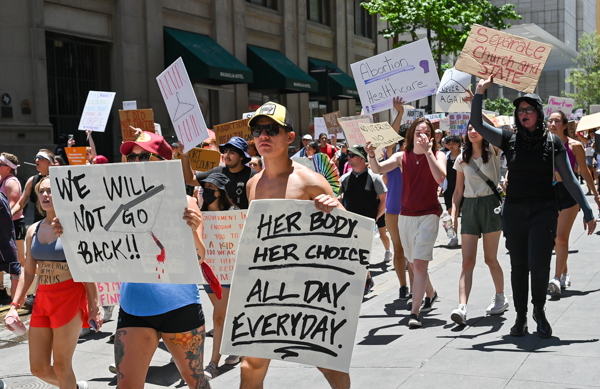Older Americans disappointed by Roe v. Wade reversal

Abortion rights protesters march through the streets of downtown Dallas to protest the overturning of Roe v. Wade.
July 19, 2022
U.S. seniors are concerned about the future of reproductive rights since the Supreme Court overturned Roe v. Wade.
According to a 2022 Pew Research Center study, 50% of U.S. adults over 50 disapprove the court’s decision. Numerous senior Americans showed their support for abortion access during the recent protests in downtown Dallas.
“It’s a freedom every American had since 1973 and now they don’t have it,” David Henley, 67, said. “I hope everybody is in shock.”
Henley is a retired chief petty officer who served in the U.S. Navy from 1973 to 1981. He went on various tours in the Philippines, Korea, Thailand and Japan. While he was primarily stationed in Japan, which had access to abortion, he had glimpses into nations with restricted access to family planning resources.
“We’re very fortunate in America to have that freedom available to women,” Henley said.
In 2016, then-presidential candidate Donald Trump promised to appoint Supreme Court judges who would overturn Roe v. Wade. He appointed three judges during his term – all of whom voted to overturn the ruling.
“I’m disappointed. I figured a lot of people in power had more sense, especially the Supreme Court justices,” Henley said.
In May, a draft of the Supreme Court’s statement for a Roe v. Wade reversal was leaked to the public, causing abortion rights protests to erupt across to America.
Despite the public outcry, the court maintained its stance.
“The Supreme Court has taken away the right women have counted on for years,” said Kelly Yendell, 51.
Roe v. Wade’s legal precedent struck down attempts to restrict abortion access.
“It’s important to understand that, while people may never personally have an abortion, the right to control your future is what makes you an equal citizen,” Yendell said.
Alongside guaranteeing abortion access, the ruling of Roe v. Wade established a precedent for reproductive rights. The reversal reduces abortion access to the state level, making access dependent on the respective state’s political majority.
“I hope that, since it’s bumped down to the states, legislators seriously consider what they need to do now since they’ve got responsibility,” Henley said.
Missouri was the first state to outlaw abortion entirely, doing so within hours of the overturn, immediately followed by South Dakota. Five more states, including Texas, banned abortion in the following month. Thirteen states are moving to implement full abortion bans.
In nine more states, the status of abortion access is uncertain. Abortion is guaranteed with little to no restriction in the remaining 21 states, all of them recognizing the right to abortion access.
“Obviously, I’m a man, so I don’t face the same struggles,” said Dave Berkowitz, 48. “But this is a question of bodily autonomy, and this is the first step of crushing a whole bunch of rights that are guaranteed by the 14th amendment.”
Berkowitz grew up in a progressive household that supported bodily autonomy rights. He came to the protest to support his wife.
“Roe v. Wade became settled into law the year I was born,” Berkowitz said. “I have lived under the guise of bodily autonomy for almost 50 years now.”
Democrats have called for signing Roe v. Wade into law since the 1973 ruling.
In reaction to the draft opinion, the U.S. Senate voted on a bill to strengthen abortion access that was eventually blocked by Republican senators and bipartisan Democrats.
On June 30, President Joe Biden asked Congress to relax filibuster rules to allow an easier passage of the failed bill.
“The Democrats should’ve done more – four times since Kennedy,” Berkowitz said. “The Democrats have had a super majority in Congress, and they did nothing to codify, so here we are.”
With the ongoing political scramble for abortion access and dissatisfaction with the Supreme Court, the future of a post-Roe America looks uncertain.
But the majority of Americans continue to stand against the reversal regardless of political demographics.
“Turn out and vote in November,” Henley said.




